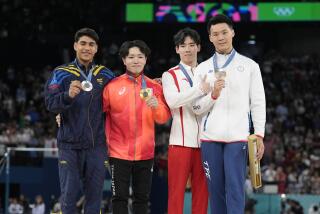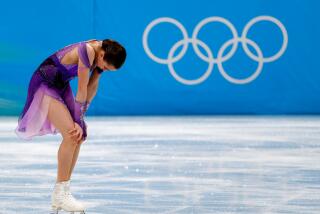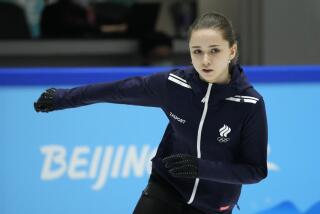Cuba’s Sotomayor Claims the Moral High Ground
- Share via
SYDNEY, Australia — High jumping, in the pharmaceutical sense of the term, was the topic of discussion Sunday at Olympic Stadium after Cuba’s Javier Sotomayor completed the most unlikely leap of his 15-year career:
Busted for cocaine in 1999, Olympic silver medalist in 2000.
Sotomayor, the only man to clear 8 feet in the high jump, was banned from competition for two years by the International Amateur Athletic Federation after testing positive for cocaine at the Pan American Games in August 1999.
The ban was supposed to have kept Sotomayor out of the Sydney Games, but after a year of legal haggling, the IAAF, in a remarkable move, essentially gave Sotomayor time off for good behavior--cutting the suspension in half because of “exceptional circumstances,” citing Sotomayor’s long and exemplary career.
That made Sotomayor Olympic-eligible again and, despite charges of a subsequent positive test for the same drug, Sotomayor took his place in the men’s Olympic high jump finals and eventually took second place--behind Russia’s Sergei Kliugin, the only competitor here to clear 7 feet 8 1/2 inches.
And that turned the medalists’ news conference, which should have been Kliugin’s chance to bask in the spotlight, into an interrogation that should have been conducted in a smoke-filled room with a bare light bulb glaring in Sotomayor’s face.
First question: What kind of message did Sotomayor think the commuting of his sentence, which resulted in an Olympic silver medal, sent to young people around the world?
“The suspension, I think the whole matter should have never reached the level it reached,” Sotomayor replied through an interpreter. “That was a matter that could have been taken care of more quickly. For a year this has affected me, affected me greatly.
“As for a message to young people, I would tell them to always play fair and clean. The difference between athletes should be only the physical differences between them.”
Sweden’s Stefan Holm, however, received a different sort of message. Holm finished fourth in the high jump final, clearing the same height as Sotomayor--7-7 1/4--but placed lower in the standings because he had more misses.
Without Sotomayor’s presence, Holm figured he’d be heading back to Sweden in possession of a bronze medal. He told reporters in the mixed zone that he believed Sotomayor should not have been allowed to compete.
“I don’t know who should think I shouldn’t be here,” Sotomayor said. “I should have been competing for a full year that I missed. I was made a victim of something that did not happen.
“If someone says I have stolen or robbed something, I have stolen nothing. I have had to put up with a lot in a year.”
Third-place finisher Abderrahmane Hammad of Algeria also cleared the same height as Sotomayor, but with one more miss. He was asked by a reporter if he felt cheated out of the silver medal.
“No, I never felt that,” said Hammad, the first African to win an Olympic medal in the high jump. “Javier Sotomayor is an athlete just like us. He had a problem and it’s been settled.
“He’s here. That’s fine. That is what competition is all about.”
American Nathan Leeper, who finished 11th at 7-4 1/2, maintained that Sotomayor’s presence made for a better competition, inspiring the other finalists to jump higher.
“He’s the world-record holder, the only man to jump 8 feet,” Leeper said of Sotomayor. “Any time you jump against him and you’re not pumped up, you’re probably dead.
“We’ll never know exactly what happened. If he was doing steroids, that’s wrong. If not, I’m happy he’s here.”
Sotomayor was asked about a recent quote in which he supposedly said he needed to win a medal in Sydney to restore his honor.
“I never said that,” Sotomayor said. “I never lost my honor. Some people have accused me on a personal level and I feel like I’ve been made a victim. I never lost my honor. During [15 years], I have been free of [illegal] substances. I never used that substance.”
Last month, however, IAAF vice president Arne Ljungqvist accused Sotomayor of failing a second test, conducted out of competition, and said Sotomayor should still be banned from the Olympics.
But the IAAF arbitration panel, which voted to slice Sotomayor’s suspension in half, said it was not informed about the second test because a positive test for cocaine is not considered an offense when it is taken out of competition.
Sotomayor disputed the findings of the second test, saying “they were erroneously marked samples and the [right] samples did not reach the laboratory.”
Sotomayor, gold medalist at the 1992 Barcelona Games, might have repeated the feat were it not for inclement weather. Shortly after the bar was raised to 7-8 1/4, it began to rain lightly over Olympic Stadium. It was still sprinkling when Kliugin cleared the height, but by the time Sotomayor made his second attempt, it was nearly pouring.
“It was impossible for me in the rain,” Sotomayor said. “I’m the worst jumper in the world in the rain.”
Kliugin, however, said he thrives on it. Coming from Russia, he regards cold, wet weather as something of a home-field advantage.
“I just lucked out here because of the rain,” said Kliugin, whose previous best finish at a major international meet was 11th at the 1997 world championships. “I am experienced with these conditions. I like them.
“There’s a high degree of risk, a high degree of entertainment. It’s exciting to see who perseveres--who can beat the rain, beat the high temperatures, beat the strong winds.
“Whatever the conditions, you have to be able to overcome them. That’s what makes our sport so beautiful.”
Out in the rain, Kliugin emerged from under the shadow of Russian countryman Vyacheslav Voronin, the 1999 world champion and 2000 world leader. Voronin struggled throughout the final, going out after three failed attempts at 7-7 1/4, finishing 10th at 7-6.
“Actually, I thought Voronin would get this gold,” Kliugin said. “He is a superstar. Basically I lucked out. That’s just about it.”
And when he heard Sotomayor grumble about not having jumped in the rain all year, Kliugin grinned, clamped a hand on Sotomayor’s left shoulder and made his rival a most generous offer.
“Come to Russia,” Kliugin told Sotomayor. “We’ll provide plenty of rain and wind for you.”
*
Other gold medals awarded Sunday:
* Heptathlon: Britain’s Denise Lewis overcame an Achilles’ injury and won the gold medal, coming from behind to edge Russia’s Yelena Prokhorova by 53 points--6,584 for Lewis, 6,531 for Prokhorova. Natalya Sazanovich of Belarus was third at 6,527 points.
World champion Eunice Barber of France was forced to retire midway through the fifth event, the long jump, because of a hamstring injury.
American Dedee Nathan finished ninth with 6,150 points.
* Women’s triple jump: Bulgaria’s Tereza Marinova took advantage of a long first attempt, jumping 49 feet 10 1/2 inches just before the downpour. Jumping into the rain, no other competitor could eclipse Marinova’s early mark that earned her the gold medal.
Russia’s Tatiana Lebedeva took the silver (49-1) and Ukraine’s Olena Hovorova the bronze (48-5 1/2).
* Hammer throw: Poland’s Szymon Ziolkowski won the gold medal on his fourth attempt, a throw of 262-2. Italy’s Nicola Vizzoni was second at 261-3 and Belarus’ Igora Astapkovich third at 259-8 1/2.
*
As expected, Australia’s Cathy Freeman qualified for the women’s 400-meter final and three Americans, led by Michael Johnson, advanced to the men’s 400.
Freeman led all women’s qualifiers with a time of 50.01 seconds. Alvin Harrison had the best mark of the men’s semifinals, 44.53, just ahead of Johnson’s 44.65. Fellow American Antonio Pettigrew was sixth at 45.24.
More to Read
Go beyond the scoreboard
Get the latest on L.A.'s teams in the daily Sports Report newsletter.
You may occasionally receive promotional content from the Los Angeles Times.






